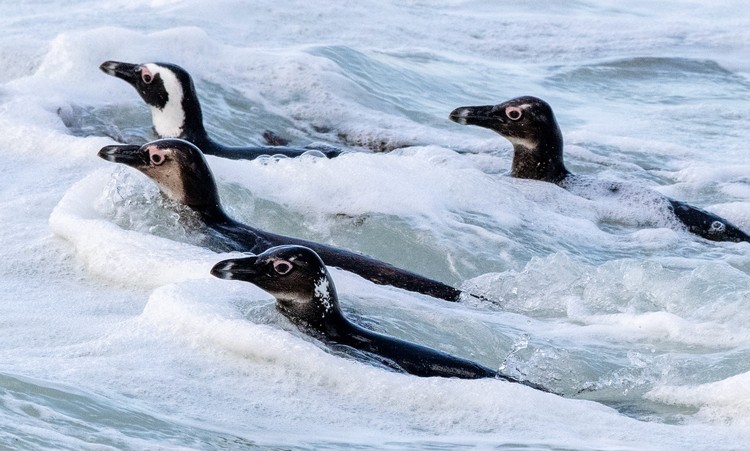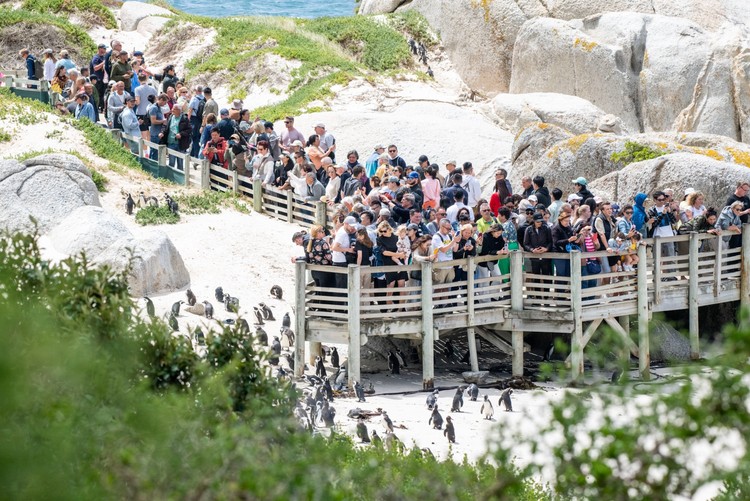African Penguins now officially “critically endangered”
The bird is facing rapid population decline from competition with commercial fisheries and climate-mediated shifts in prey populations
Young adult African Penguins swimming at the Boulders Penguin Colony near Simon’s Town, Cape Town. Photos: John Yeld
- From millions of African Penguin in the early 1900s, there are now only about 8,000 breeding pairs left.
- The International Union for the Conservation of Nature has elevated the bird’s risk of extinction status to “critically endangered”.
- “If we don’t act timeously, we could lose Africa’s only penguin species within our lifetime,” an expert warns.
- The economic value of the iconic bird is in the billions of rands, according to a new report.
It is official: the African Penguin, the continent’s only penguin species, is now considered “critically endangered”.
The decision was announced on Monday by the International Union for the Conservation of Nature (IUCN) which manages the Red Lists of Threatened Species world-wide. These lists are considered the “gold standard” for measuring extinction risk.
There are 18 penguin species globally, and the iconic African Penguin is the first to meet the criteria for this classification – just one rank below the “extinct in the wild” category.
According to the IUCN, the African Penguin has been raised from “endangered” to “critically endangered” because it is undergoing “an extremely rapid population decline, probably principally because of the impacts of competition with commercial fisheries and climate-mediated shifts in prey populations”.
Beside food shortages from shifts in the distributions of prey species and competition with commercial purse-seine fisheries, other factors for its population decline include historic egg collection and disturbances, such as guano harvesting on breeding islands, oil pollution, increased maritime traffic and associated activities like offshore bunkering and competition with and predation by Cape fur seals.
“Recent, near-complete count data for the number of breeding pairs show an alarming acceleration in the rate of decline and the current and future projected population reduction exceeds 80% over three generations. This trend currently shows no sign of reversing, and immediate conservation action is required,” the IUCN said.
Two bird conservation organisations, BirdLife SA and SA National Foundation for the Conservation of Coastal Birds (SANCCOB), are currently in litigation with the national government over penguin conservation efforts relating to closed fishing zones around penguin breeding sites where the birds compete with the pelagic fishing industry for their prey: pilchards and anchovies.
Prominent African Penguin researcher Dr Richard Sherley of the University of Exeter said the IUCN’s decision highlighted “a much bigger problem with the health of our environment”.
“Despite being well-known and studied, these penguins are still facing extinction, showing just how severe the damage to our ecosystems has become. If a species as iconic as the African Penguin is struggling to survive, it raises the question of how many other species are disappearing without us even noticing. We need to act now – not just for penguins, but to protect the broader biodiversity that is crucial for the planet’s future.”
Nicky Stander, SANCCOB’s Head of Conservation, described the plummeting penguin population as “devastating”. “Knowing they are now officially ‘Critically Endangered’ is a sobering thought. These animals are a key indicator of the wider ecological health of our ocean and are beloved worldwide. We cannot wait any longer for change.”
Dr Alistair McInnes, Seabird Conservation Programme Manager at BirdLife SA, said the availability of sardines and anchovies was the key driver of the African Penguin population and that the sustainable management of purse-seine fishing, such as the implementation of effective no-take zones around the last remaining large colonies, was a “critical intervention” to help conserve this species.
“If we don’t act timeously, we could lose Africa’s only penguin species within our lifetime,” he warned.
Jo Coumbe, communications director of ocean conservation charity Blue Marine which is helping with penguin conservation, described the plight of the African Penguin as “heart-breaking”.
“Losing the bird isn’t just about losing a species, it’s a stark warning of the tragic impacts on biodiversity and the health of our ocean,” she said.
Economic asset
According to a new report released just a week before Monday’s announcement, the African Penguin is a significant economic asset possibly worth billions to South Africa’s tourism economy annually.
Overall, the report estimated the total value that the African Penguin created for South Africa in 2023 was between R2 billion and R4.5 billion, when categories such as the property market, existence value, environmental education and brand awareness through media exposure were also taken into account.
“The conservation of African Penguins represents not just an environmental priority, but also a significant economic and social opportunity for South Africa,” says the Endangered Wildlife Trust, a non-government conservation group that commissioned the report in partnership with the national Department of Forestry, Fisheries and the Environment (DFFE).
Produced by Cape Town-based Anchor Environmental Consultants with input from the African Penguin Biodiversity Management Plan Working Group, the report estimates the tourism, recreation and existence value of African Penguins, and describes property-related, media-related and educational benefits, as well as potential reputation risk for failing to adequately conserve the penguins.
The report authors estimate the total tourism value of the Boulders colony near Simon’s Town to be between R505-million and R2.3 billion annually. Last year, this colony generated some R95-million in revenue from entrance fees alone. The total tourism value of this plus the other penguin colonies is estimated to be in the range of R613-million to R2.7-billion per year, the report says.
A second category of value is benefits that people receive just from knowing of the continued existence of wild African Penguin colonies, irrespective of whether they aim to ever visit them. This existence value benefit is expressed through their stated “willingness to pay” (WTP) to ensure the birds’ conservation, the report explains.
Based on a valuation study involving interviews with people from all parts of Cape Town, the aggregate WTP for penguin conservation of Capetonians is estimated to be in the range of R551-million to R731-million per year.
“Taking the relationship between WTP and income levels into account, this suggests that the national existence value of African Penguins could be in the order of R1.3–1.8 billion per year.”
In its response, the Endangered Wildlife Trust says the report’s findings underscore the urgent need for targeted conservation measures that protect the species and maintain the benefits they provide.
The Boulders Penguin Colony near Simon’s Town is one of the most popular tourism elements of the Table Mountain National Park.
Support independent journalism
Donate using Payfast

© 2024 GroundUp. This article is licensed under a Creative Commons Attribution-NoDerivatives 4.0 International License.
You may republish this article, so long as you credit the authors and GroundUp, and do not change the text. Please include a link back to the original article.
We put an invisible pixel in the article so that we can count traffic to republishers. All analytics tools are solely on our servers. We do not give our logs to any third party. Logs are deleted after two weeks. We do not use any IP address identifying information except to count regional traffic. We are solely interested in counting hits, not tracking users. If you republish, please do not delete the invisible pixel.


